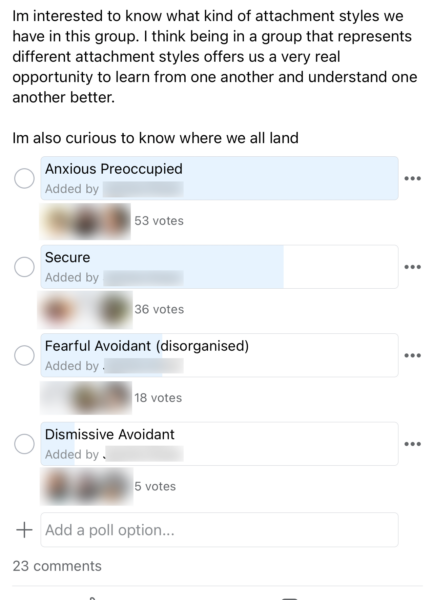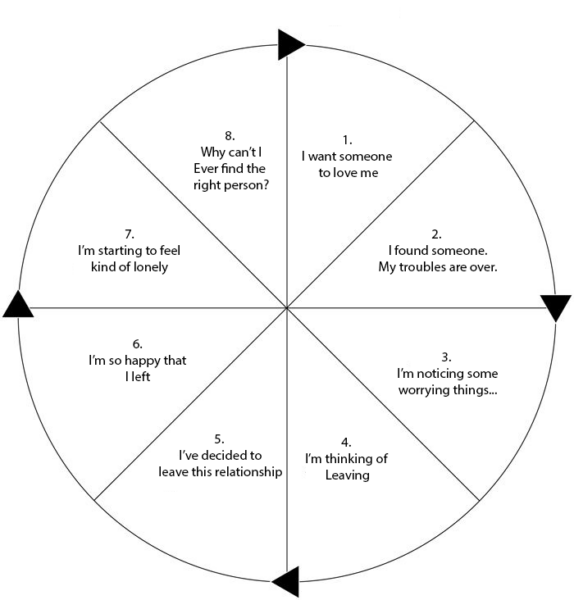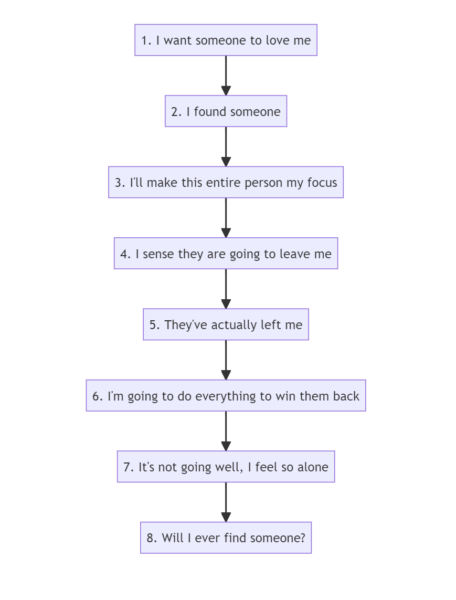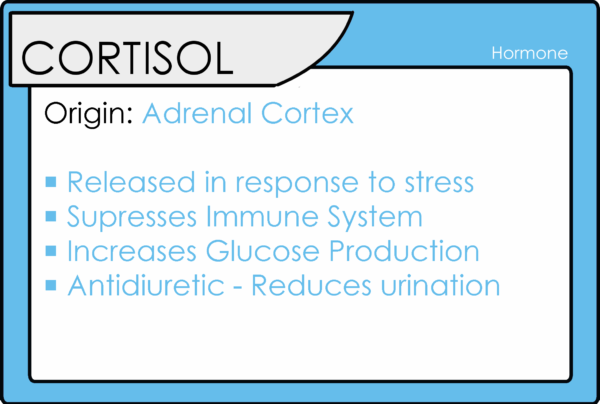If you’ve ever wondered why your ex has been appearing in your dreams then you came to the right place.
I spent an entire day researching everything I could about dreams and how they work and ultimately I believe that it’s likely that an ex appears in your dreams for one of seven reasons.
- The ex is part of the emotional processing
- It’s happening due to memory consolidation
- Your attachment style
- It’s part of your daily residue
- It is wish fulfillment
- It’s part of stress and anxiety
- You’ve formed a neural pathway
Let’s take a beat and break down the thought behind each one of these reasons.

What Are Your Chances of Getting Your Ex Boyfriend Back?
Take the quizReason #1: Emotional Processing
So, it’s important to understand that dreams often serve as a space for emotional processing.
So, after you go through a breakup, there’s all of these unresolved emotions and feelings, and dreams can offer a way to help you process those feelings.
In fact, I found two sources that backed this up.
There was a Newsweek article that was basically saying:
That dreams help triage the emotions, store positive memories or emotions, and dampen negative memories and emotions. This is all part of your brain’s function.
Then, I found another article from Ouraring.com, which basically states that:
REM sleep can allow you to work through upsetting memories in a safer, calmer environment, reducing mental and emotional stress. Also, processing upsetting memories may reduce the intensity of your emotional response to them once you’re awake, helping to reduce any negative emotions that may have led to stress.
It’s kind of amazing that dreams, even when we’re sleeping, are meant to serve this type of purpose. I’ve seen a lot here in my years at Exploit for Recovery, and some of the most stressed individuals come through here.
One of the interesting hallmarks of people who are struggling with breakups is that they actually struggle with sleep.
It kind of creates this negative domino effect where they actually need to get a good night’s sleep so that the emotional processing can take place, but they’re unable to because of how stressed they are. They don’t get enough sleep, so that emotional processing doesn’t happen, and so on and so forth.
But if you’re simply wondering, “Hey, why does my ex keep appearing in my dreams?” it could be possible that your brain is just emotionally processing all of the things.
Reason #2: Memory Consolidation
During REM sleep, the brain goes through a process of memory consolidation.
Therefore, interactions with your ex, especially if they were significant or emotionally charged, are memories that might be reviewed and processed during this time.
This is actually very similar to emotional processing; I think it’s just on a deeper level.
I found a paper stored in the National Library of Medicine that basically said:
One important clue is that different types of memory (e.g., procedural, episodic) appear to be best consolidated during specific stages of sleep. REM sleep may be preferentially important for the consolidation of procedural memories and some types of emotional information (see Karni et al.)
So, memory consolidation essentially is just helping your brain process which memories to store and which ones to kind of not take too much stock into.
You’ll notice that I’ve paired both emotional processing and memory consolidation quite closely together because essentially they’re doing the same thing.
Usually, memory consolidation will happen first and then emotional processing will often happen second. But I actually think things get incredibly interesting when we look at reason number three.
Reason #3: Attachment Styles
Scientists and psychologists have found that individuals with certain attachment styles, like anxious attachment, are more likely to dream about their exes.
This is because they have a harder time letting go and moving on.
I’ve found outside research to back this up, and we also have substantial internal research.
We’ve observed that the majority of our clients going through breakups have an anxious attachment style.

What Are Your Chances of Getting Your Ex Boyfriend Back?
Take the quizWhat’s intriguing about anxious attachment styles is that they often stem from a core wound of fearing abandonment.
When these individuals face a breakup, their worst fear materializes; they feel abandoned. This results in a self-perpetuating cycle of anxiety and obsessive thoughts about their ex, leading them into a negative feedback loop.
Interestingly, I’ve extensively discussed what I call the “avoidant death wheel” in the past.
Most of our clients have anxious attachment styles, but their exes predominantly exhibit avoidant attachment styles, either dismissive avoidant or fearful avoidant.
I’ve created a graphic illustrating the process a dismissive avoidant goes through during a breakup.
Parallelly, I’ve also devised what I term the “anxious attachment death cycle.”
The reason I mention this is to help individuals recognize the loop they might be trapped in, making it more likely for them to dream about their ex due to their incessant thoughts about them.
The anxious attachment death cycle spans from the beginning of one relationship to the start of the next. This cycle typically has eight stages:
- The desire to be loved.
- Finding someone and feeling that all problems are resolved.
- Prioritizing the new partner above all.
- Sensing that they might leave.
- Facing the reality of the breakup.
- Making desperate attempts to reconcile.
- Feeling extreme loneliness when reconciliation attempts fail.
- Questioning the possibility of ever finding love again.
Subsequently, one either reunites with their ex or finds another partner, re-entering the same cycle.
It’s evident that the focus remains largely on the ex throughout.
This preoccupation, combined with the effects of anxious attachment, heightens the probability of the ex appearing during dreams, especially during phases of memory consolidation and emotional processing.
Reason #4: Daily Residue
There’s not a ton to talk about here because we’ve already sort of hammered this home.
But sometimes, when we dream, what we dream about is influenced by our day-to-day experiences.
So, if someone is often thinking about their ex or encountering reminders throughout the day, it’s going to be a lot more likely that their ex is going to appear in their dreams. I think we’ve all experienced something like this.
And I think, actually, this is probably aided by how anxious you are.
So, you can actually look at your own past experiences with dreaming and pinpoint the exact times that you were incredibly stressed about something, were thinking a lot about it, and then that thing appeared in your dreams.
Well, because it’s so top of mind, because it’s the daily residue, and because you’re influenced by your day-to-day experiences, it increases the odds of it happening.
Reason #5: Wish Fulfillment
According to some psychoanalytic theories, dreams may represent suppressed desires or unmet needs.
Dreaming of an ex might indicate a desire for closure, understanding, or reconnection.
For this, you really have to delve into Sigmund Freud’s dream theory.
I found a quote from a website called Simply Psychology that I believe captures this concept accurately.

What Are Your Chances of Getting Your Ex Boyfriend Back?
Take the quizFreud proposed that dreams are a form of wish fulfillment. They represent the unconscious desires, thoughts, and motivations that our conscious mind represses. This concept has influenced not only the field of psychology but also literature, art, and popular culture.
If you subscribe to this idea that dreams are part of wish fulfillment – and opinions vary on this – bear with me.
Since your mind is inclined towards thinking about your ex, especially if you potentially have an anxious attachment style, and when you enter the emotional processing stage or the memory consolidation stage, you’re more likely to think about your ex.
But the key point about wish fulfillment is that many with an anxious attachment style, which we just discussed, primarily aim to win their ex back. They believe this will alleviate their feelings. Freud might argue that because of this wish, your ex is more likely to appear in dreams.
Reason #6: Stress and Anxiety
We’ve already established that the vast majority of the people I study have anxious attachment styles.
This means they are anxious and stressed, and breakups, in and of themselves, can be a significant source of stress and anxiety.
The brain might be trying to cope with the stress by working through it in dreams, as part of memory and emotional processing. However, the interesting point I want to bring to your attention is the role cortisol plays during breakups.
I’ve studied breakups for virtually my entire professional life, and it’s clear that when you go through a breakup, your cortisol levels surge.
Now, cortisol is also known as the stress hormone.
A couple of months ago, I came across research stating that on a typical day, if you feel stressed about something, it usually takes around three to four hours to move past that stress.
But if you’re constantly stressed, this period can extend to as long as six months.
So, when you’re going through a breakup, obsessing over your ex, and given our modern age where we can track our exes on social media, this continual exposure can increase stress which might influence your dreams.
Reason #7: Neural Pathways and Habits
If someone has spent a significant amount of time with an ex, they’ve likely created a neural pathway associated with that person.
Even after the relationship ends, these pathways can still be activated, especially during the unstructured, free-flowing state of dreaming.
I found an informative article from Science Direct discussing this concept.
Here’s an exact quote:
“Two major theories have been proposed regarding the neural circuits involved in dreaming. One is that dreams are generated by the activation of neural activity in the brainstem and its signal transmission to the cortex. The other is that dreams result from forebrain activation by dopamine. While the physiological function of dreams remains ambiguous, several theories have been put forth related to memory and emotions.”
It’s the first part of this quote, regarding neural pathways, that’s relevant.
Dreams are triggered by the activation of neural activity in the brainstem and its transmission to the cortex.
Though this isn’t definitive, it’s a leading hypothesis. If you’ve spent a considerable amount of time with an ex, it’s probable that such a neural pathway exists, leading to dreams about them.
However, the key is spending a significant duration with an ex.
“Significant” typically means years, not just a month of a honeymoon phase followed by a major disagreement and breakup.

What Are Your Chances of Getting Your Ex Boyfriend Back?
Take the quizFor me, “significant” typically means around a year.





